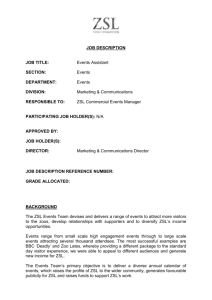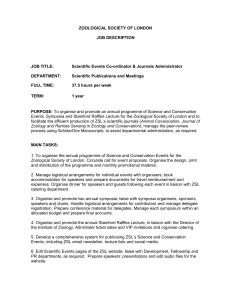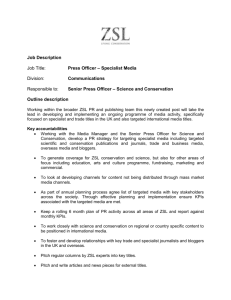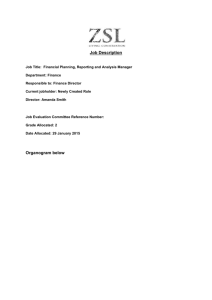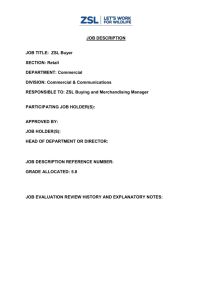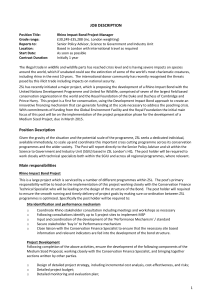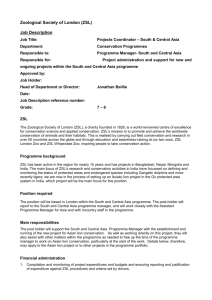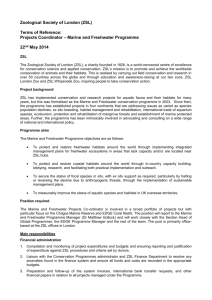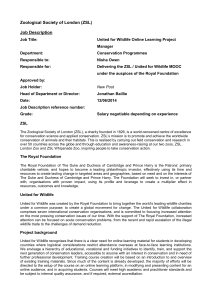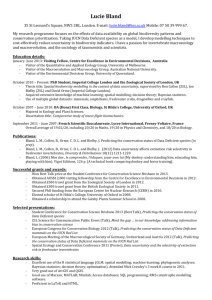1 - Zoological Society of London
advertisement
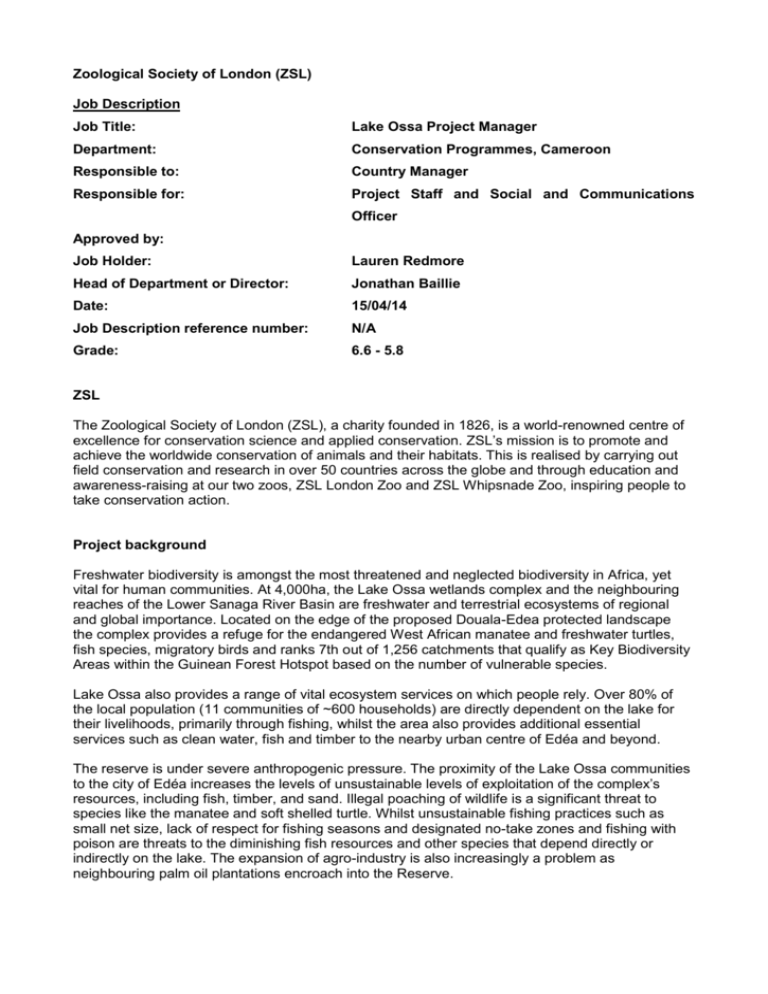
Zoological Society of London (ZSL) Job Description Job Title: Lake Ossa Project Manager Department: Conservation Programmes, Cameroon Responsible to: Country Manager Responsible for: Project Staff and Social and Communications Officer Approved by: Job Holder: Lauren Redmore Head of Department or Director: Jonathan Baillie Date: 15/04/14 Job Description reference number: N/A Grade: 6.6 - 5.8 ZSL The Zoological Society of London (ZSL), a charity founded in 1826, is a world-renowned centre of excellence for conservation science and applied conservation. ZSL’s mission is to promote and achieve the worldwide conservation of animals and their habitats. This is realised by carrying out field conservation and research in over 50 countries across the globe and through education and awareness-raising at our two zoos, ZSL London Zoo and ZSL Whipsnade Zoo, inspiring people to take conservation action. Project background Freshwater biodiversity is amongst the most threatened and neglected biodiversity in Africa, yet vital for human communities. At 4,000ha, the Lake Ossa wetlands complex and the neighbouring reaches of the Lower Sanaga River Basin are freshwater and terrestrial ecosystems of regional and global importance. Located on the edge of the proposed Douala-Edea protected landscape the complex provides a refuge for the endangered West African manatee and freshwater turtles, fish species, migratory birds and ranks 7th out of 1,256 catchments that qualify as Key Biodiversity Areas within the Guinean Forest Hotspot based on the number of vulnerable species. Lake Ossa also provides a range of vital ecosystem services on which people rely. Over 80% of the local population (11 communities of ~600 households) are directly dependent on the lake for their livelihoods, primarily through fishing, whilst the area also provides additional essential services such as clean water, fish and timber to the nearby urban centre of Edéa and beyond. The reserve is under severe anthropogenic pressure. The proximity of the Lake Ossa communities to the city of Edéa increases the levels of unsustainable levels of exploitation of the complex’s resources, including fish, timber, and sand. Illegal poaching of wildlife is a significant threat to species like the manatee and soft shelled turtle. Whilst unsustainable fishing practices such as small net size, lack of respect for fishing seasons and designated no-take zones and fishing with poison are threats to the diminishing fish resources and other species that depend directly or indirectly on the lake. The expansion of agro-industry is also increasingly a problem as neighbouring palm oil plantations encroach into the Reserve. Recognizing this, ZSL in partnership with the Conservation Service and local NGOs, has initiated a programme to address these threats, engage stakeholders and ensure the reserve is sustainably managed for future generations. The project has four broad elements: - Developing and implementing a Lake Ossa reserve management plan, that delineates the reserve boundary, incorporates community zoning for fishing and eliminates destructive fishing practices. - Engaging local communities in sustainable livelihood initiatives. - Engaging the private sector to reduce their negative impacts on the Lake Ossa complex. - Strengthening the capacity of the Conservation Service to manage and protect the reserve and its wildlife. Project Aims This project is aimed at improving management practices and capacity of local communities, MINFOF, and agroindustry to secure freshwater biodiversity and equitable livelihood development in the Lake Ossa Reserve. Specifically, this project will involve the development of a zoned management plan for the Reserve, enhancement of local community well-being through VSLAs, sustainable fishing practices and diversified livelihoods. The project will also encourage lake cleanup and lake shore rehabilitation, and engage with neighbouring agro-industries for improved Reserve management. . Position The Lake Ossa Project Manager (LOPM) will be responsible for the delivery of this Darwin Initiative funded project (started in April 2014), coordinating and implementation the project’s activities, liaising with project partners and monitoring and evaluating project progress. The LOPM will also be responsible for further developing the project and securing additional funds for its delivery. The LOPM will report to ZSL’s Cameroon Country Manager within the West and North Africa Programme of ZSL’s Conservation Programmes department. The LOPM will work closely with colleagues in ZSL’s North and West Africa team, the Marine and Freshwater International programme, and other ZSL departments as appropriate. The position may also be required to provide some limited support to other ZSL-Cameroon initiatives based on the qualifications and expertise of the post holder. Main responsibilities Stakeholder relationships 1. Maintain existing, and develop new relationships and partnerships with relevant stakeholders including Cameroonian authorities, donor agencies, local and international NGOs, private sector actors, research institutions and local communities; including negotiation of Memoranda of Understanding or contracts to formalise and clarify details of any partnership. 2. Regular communication with in-country partners regarding progress and any relevant issues surrounding the project. Project management 3. Setting of and adherence to project objectives and annual work plan as agreed with the country manager at start of project and annually via ZSL’s Performance and Development Review process. 4. Liaison with country manager and project personnel to ensure that agreed work is completed on schedule, to budget and in compliance with ZSL health and safety procedures and UK/incountry laws and regulations. 5. Recruitment of suitable field team(s) in collaboration with relevant partners. 6. Management of local staff, planning of work schedules (including monitoring of time sheets where required and signing off on leave and illness), organisation and recording of per diems and oversight of travel logistics (including keeping of vehicle travel logs). 7. Purchase (according to procurement plans as required), management and recording of survey equipment, supplies and vehicles (including keeping of equipment log). 8. Management of project budgets and accounts and keeping of financial records, with submission of a financial report every month to the country manager. 9. Production of monthly technical reports, ensuring the relevant sections of the ZSL Projects Database (ZPD) are kept updated and technical and financial reports to project donors as required, for review by the country manager. Research and fieldwork 10. Planning of fieldwork, following a scientifically-sound experimental design (including methods, timeline, budget and suitable study sites) agreed with the country manager and relevant colleagues. 11. Execution of surveys, through either direct participation or oversight and regular checks of trained field team, ensuring all surveys are completed to budget and on time and ensuring data quality, secure storage and availability in compliance with ZSL and relevant partner data ownership policies. Capacity building 12. Training of relevant ZSL and partner staff as per the project workplan and in any other relevant areas agreed with the country manager. 13. Provide support, as necessary, to ZSL EDGE fellows and related research. 14. Selection (where appropriate), guidance and supervision of local and international students carrying out agreed research projects in conjunction with the project, including training in research, survey and analysis techniques as appropriate. 15. Promotion of environmental awareness and best practice amongst government, industry and the general public where appropriate. Dissemination 16. Dissemination and promotion of project and research findings to relevant communication outlets when possible and according to project guidelines (i.e. scientific journals, technical reports, national and international fora, newsletters, local media sources, etc.) 17. Submission of regular updates for colleagues/partners/donors/stakeholders, regular updates for ZSL communications (e.g. blogs, social media, website, etc.), as agreed with the country/programme manager. 18. Preparation and distribution of any reports required by government and other in-country stakeholders, in collaboration with project partners. Representation and promotion of ZSL 19. Representation of ZSL at, and participation in, relevant national, regional and international conservation policy/planning events (as funds allow). 20. Participation in the development of ZSL’s conservation strategy and policies, particularly with reference to the postholder’s own area of operation. Project development 21. Development of funding proposals for the project as required/advantageous. 22. Development of new aspects of the project that are in line with ZSL’s long-term strategic aims, and assistance in gaining national/regional/international recognition and funding for such proposed work. 23. Assistance with identification of conservation needs and funding sources and contributing to funding applications for other potential projects in-country which fall within ZSL’s area of expertise and interest. General 24. To undertake appropriate administrative tasks; 25. To comply with the relevant ZSL policies; and maintain safe workplace practices and procedures in accordance with UK health and safety legislation, ZSL Health and Safety guidelines and any relevant Cameroonian legal requirements, undertaking relevant training where necessary. 26. Ensure effective quality control and continuous improvement in all aspects of the work and responsibilities attached to this post 27. Be committed to professional self-development as necessary for the successful carrying out of the job 28. Undertake such other duties as are commensurate with the grade of the post, as may be reasonably required at the initial place of work or at other locations. NB: This job description is designed to outline a range of main duties that may be encountered. It is not designed to be an exhaustive list of tasks and can be varied in consultation with the post holder in order to reflect changes in the job or the Society. Qualifications, Knowledge and Experience Required 1. Proven experience in a relevant field such as community based conservation, social science, or fisheries management. 2. Significant experience in project management, fieldwork and training, and with working knowledge of Africa. 3. Experience living and working in west/central Africa desirable 4. A good understanding of biodiversity conservation and development issues. 5. A Bachelor’s degree, or preferably higher, in an appropriate subject or considerable relevant experience 6. Excellent written and spoken French with English desirable 7. Strong organisational, interpersonal and presentation skills 8. Proven budget management and report-writing ability 9. Good verbal and written communication skills 10. Proven ability to work effectively with teams and senior managers
